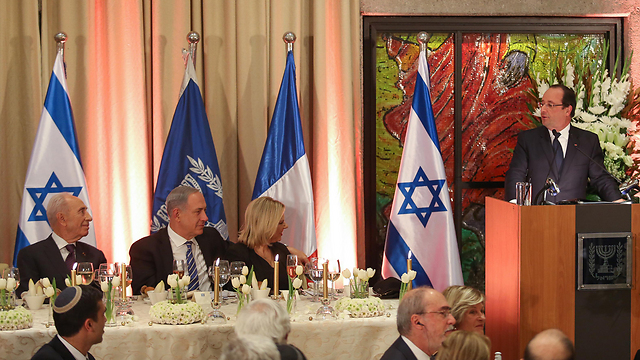Israel has failed in its diplomatic efforts to prevent a nuclear agreement between Iran and world powers, senior state officials in Jerusalem admitted Monday night.
The nuclear talks are expected to resume in Geneva on Wednesday, and Israeli officials estimate that unless an unexpected crisis takes place, an interim agreement will be signed in this round or shortly afterwards.
Related stories:
- Iran's Rohani warns against 'excessive' nuclear demands
- Oil prices ease ahead of Iran nuclear talks
- Op-ed: The weak alliance
Meanwhile, sources in Jerusalem have also criticized the recent conflict with the United State. "It's causing damage. (US Secretary of State) John Kerry is not Israel's enemy," one of the officials said.
"We are at least taking comfort in the fact that there may be some amendments compared to the previous agreement which wasn't signed," said a state official involved in the details. "However, we believe that ahead of the bigger agreement we have managed to direct the world's attentions to the important clauses."
Israeli officials say the sanctions on Iran will likely be eased by billions of dollars, which is expected to strengthen the collapsing Iranian economy.

Official dinner at President's Residence for Francois Hollande (Photo: Noam Moskowitz)
In the past two weeks, Prime Minister Benjamin Netanyahu and some of his ministers have been trying to influence the content of the agreement set to be signed soon. In addition to numerous interviews to the media, Netanyahu and his ministers spoke to senior Western officials in a bid to convince them to change the deal taking shape.
Following these efforts, sources in Jerusalem said Monday night that there was a chance that some of the clauses would be amended in order to make things difficult for the Iranians. Nonetheless, state officials are speaking about the current talks as "a round we lost in."
Netanyahu has been trying in the past two days to convince French President Francois Hollande to oppose the agreement, which he defines as "very bad." On Wednesday, Netanyahu will head to Moscow for a meeting with Russian President Vladimir Putin.
Two days ago there were still some state officials who hoped Netanyahu would be able to convince Putin to work to change the deal, but that hope seems to have disappeared too.
During the festive dinner held Monday at the President's Residence in honor of Hollande's visit to Israel, President Shimon Peres said: "Israel thanks you for demonstrating leadership in deciding to block Iran from fulfilling its dangerous ambitions. Your unequivocal convictions influence the entire international community.
"You have made it clear that without intense pressure, Iran will continue to threaten the peace in Israel, the Middle East and the world. This pressure should not be stopped until Iran proves its intentions with actions, not just words."
Meanwhile, the dispute between Netanyahu and Kerry continues. On Monday, the US secretary of state commented on the Israeli prime minister's criticism over the upcoming deal with Iran, saying that he believed Netanyahu was wrong when he said that such a deal would harm Israel's security.
"I have great respect for his concerns about his country," Kerry said in Washington, but maintained that instead of making Israel less safe, an accord with Iran would actually reduce the country's risk.
An Israeli state official asked if the rift with the United States was serious enough to damage the relations between the countries, said: "They are starting to get offended. The personal things said by anonymous sources in Israel about Kerry were exaggerated and should not have been said. It causes damage. Kerry is not Israel's enemy."
Kerry was scheduled to arrive in Israel this weekend, but said the visit would likely be postponed and that he would try to make it after Thanksgiving, in late November.
- Follow Ynetnews on Facebook and Twitter
- Receive Ynetnews updates
directly to your desktop















